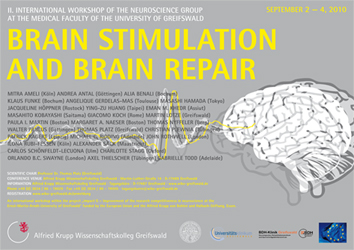The multi-professional targeted approach of neurorehabilitation can enhance recovery of functional deficits beyond spontaneous recovery and consequently improve quality of life: Specifically tailored therapeutic interventions address very specific information processes in the brain, re-train skills and thereby improve performance and abilities step by step. As a consequence of training, centres within the brain responsible for these functions become effectively re-actived, functional re-organisation of the brain occurs and ensures long-term benefits of training therapy.
The non-invasive brain stimulation techniques of repetitive or patterned transcranial magnetic stimulation (rTMS) can focally influence the excitability of specific brain areas and might promote these functional adaptations in concert with and potentially beyond training therapy. rTMS holds much promise as a potential therapeutic intervention in a wide range of neurological conditions. However, many questions need to be addressed before a more widespread use in clinical practise can be recommended. The symposium on brain stimulation and brain recovery will shed light on these issues.
State-of-the-art knowledge about rTMS effects from animal experiments to clinical trials in conditions such as stroke, Parkinson disease and depression will be presented by senior researchers in the field from all around the world coming from various neuroscience and medical fields. This concentrated multi-disciplinary in depth approach on brain stimulation with rTMS and recovery will facilitate our understanding of mechanisms, effects, and therapeutic potentials of rTMS, and will promote future research from bench to bed side. The results of the symposium will timely be made available with a special issue of the journal Restorative Neurology and Neuroscience.
Thursday, September 2, 2010
17.00 Welcome Address
Bärbel Friedrich (Greifswald, Germany)
Academic Director of the Alfried Krupp Wissenschafts-kolleg Greifswald
Conference Chair’s Address
Thomas Platz (Greifswald, Germany)
Opening Lecture
18.30 Reception and Buffet
Friday, September 3, 2010
9.00 — 12.30
Metabolic and haemodynamic effects of rTMS
Immediate and prolonged effects of theta burst stimulation (TBS) and conventional lowfrequency rTMS on the rat cortex — concepts and overview
Klaus Funke (Institut für Neurophysiologie, Universität Bochum)
Theta burst and conventional low-frequency rTMS differentially affect GABAergic neurotransmission in the rat cortex (GAD and Ca-binding proteins expression)
Alia Benali (Institut für Neurophysiologie, Universität Bochum)
Neurochemical effects of theta burst stimulation
Charlotte Stagg (FMRIB Centre, University of Oxford)
Neural substrates of low-frequency rTMS during movement in healthy subjects and acute stroke patients. A PET study
Angelique Gerdelas-Mas (INSERM U 825, Universités de Toulouse)
Assessing the effects of TMS on brain activity in a quantifiable fashion by interleaved TMS/CASL (continuous arterial spin-labeling): Comparison of different rTMS protocols
Axel Thielscher (MPI for Biological Cybernetics, Tübingen)
11.00 — 11.30 Coffee break
11.30 — 12.30
Specificity and Modification of rTMS effects
Optimizing functional accuracy of TMS in cognitive studies: a comparison of methods
Alexander Sack (Faculty of Psychology and Neuroscience, Maastricht University)
Optimizing stimulation parameters for theta burst stimulation applications
Walter Paulus (Clinical Neurophysiology, Georg-August-University Göttingen)
12.30 Lunch break
14.00 — 18.30
The complex relationship between voluntary movement and rTMS-induced plasticity in motor cortex
Gabrielle Todd (School of Molecular and Biomedical Science, University of Adelaide)
The effect of continuous theta burst stimulation on circuits in the motor cortex and spinal cord and its modulation by physiological activity and a NMDA receptor antagonist
Ying-Zu Huang (Department of Neurology, Chang Gung Memorial Hospital and Chang Gung University, College of Medicine, Taipei)
Suppression of ipsilateral motor cortex facilitates motor skill learning
Masahito Kobayashi (Department of Neurosurgery, Saitama Medical University)
15.30 — 16.00 Coffee break
Electrophysiological correlates of reduced pain perception after theta burst stimulation
Andrea Antal (Clinical Neurophysiology, Georg-August-Universität Göttingen)
Effects of priming stimulation (metaplasticity) in human rTMS studies — concepts and overview
Michael C. Ridding (Neuromotor Plasticity & Development (NeuroPAD),The Robinson Institute School of Paediatrics and Reproductive Health, University of Adelaide)
Modulation of effects of iTBS applied over M1 by conditioning stimulation of the opposite M1
Patrick Ragert (Max-Planck-Institut für Kognitions- und Neurowissenschaften, Abteilung Kognitive Neurologie, Leipzig)
TMS-jamming during complex movement performance — evidence for functional involvement in healthy subjects and stroke patients
Martin Lotze (Baltic Imaging Center, Diagnostische Radiologie und Neuroradiologie, Ernst-Moritz-Arndt-Universität Greifswald)
Effects of TBS on motor performance and motor learning and its pharmacological modification
Orlando B.C. Swayne (Sobell Department of Motor Neuroscience and Movement Disorders, Institute of Neurology, University College London)
19.00 Social programme
Saturday, September 4, 2010
9.00 — 14.15
Clinical effects of rTMS
Curing the brain by applied neurophysiology — fact or fiction?
John Rothwell (Sobell Department of Motor Neuroscience and Movement Disorders, Institute of Neurology, University College London)
Short- and long-term effect of rTMSon motor function recovery after acute ischemic stroke
Eman M. Khedr (Department of Neurology, Assiut University Hospital)
Effects of ipsilesional and contralesional rTMS on motor recovery in cortical and subcortical stroke
Dennis A. Nowak (Klinik Kipfenberg, Neurologische und Neurochirurgische Fachklinik)
Effects of parietal theta burst stimulation trains on visual attention and visual neglect
Thomas Nyffeler (Abteilung für kognitive und restorative Neurologie, Inselspital Bern)
Research with rTMS in the treatment of aphasia
Paula I. Martin, Margaret A. Naeser (Harold Goodglass Boston University, Aphasia Research Center, Department of Neurology, Boston University School of Medicine and the Veterans Affairs)
11.00 — 11.30 Coffee break
Effects of coupled rTMS and speech therapy on language and brain activation in subacute stroke patients
Ilona Rubi-Fessen (RehaNova Köln)
High-frequency rTMS over the supplementary motor area improves bradykinesia in Parkinson’s disease
Masashi Hamada (Department of Neurology, Division of Neuroscience Graduate School of Medicine, University of Tokyo)
Cerebellar magnetic stimulation decreases levodopa-induced dyskinesias in Parkinson disease
Giacomo Koch (Laboratorio di Neurologia Clinica e Comportamentale Fondazione Santa Lucia, IRCCS, Rome)
Efficacy and safety of bilateral continuous theta burst stimulation (cTBS) for the treatment of chronic tinnitus: a three-armed randomized controlled trial
Christian Plewnia (Neurophysiology & Interventional Psychiatry, Universitätsklinikum Tübingen)
Influence of rTMS on depression and its symptoms
Jacqueline Höppner (Universitätsklinik für Psychiatrie und Psychotherapie, Rostock)
Antidepressant effects of augmentative transcranial magnetic stimulation. Randomised multicentre trial
Carlos Schönfeldt-Lecuona (Universitätsklinik für Psychiatrie und Psychotherapie III, Ulm)
14.00
Closing
Thomas Platz (BDH-Klinik Greifswald, Ernst-Moritz-Arndt-Universität Greifswald)
14.15 Farewell lunch

